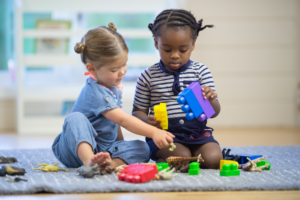Cooperation: how can I teach my child to cooperate?

Cooperation is the ability to work together with someone else. We sometimes believe that cooperative children do what we want. This is not cooperation; this is compliance. We want children to understand why working together is important to carry out our goals. Working with others is a skill we can begin teaching children at a very young age.
Tips for Teaching Cooperation
Take turns (click to expand) »Very young babies can begin to engage in back-and-forth activities. They also imitate everything you do. Take turns when you play peek-a-boo with your baby. As they grow, you can take turns shoveling sand in a bucket and then pouring it out. Take turns building a tower with blocks. Playing provides the opportunity to learn essential social skills: taking turns, sharing, and cooperating. When it is time to clean up, take turns putting toys away. These daily activities are moments when children can feel satisfied by being part of something you carried out together. |
Work together (click to expand) »As your child grows, give them small tasks around the house. Start first by doing things together, maybe setting the table for supper. Let your child be the one who puts the forks on the table for supper every day. Point out the advantages of cooperating. “Look how fast we folded socks! Now we have time to read a book before supper.” Show your child the importance of cooperation by giving them small tasks around the home. Children learn to be responsible and cooperative by having responsibilities around the house. Once your child is old enough, have them pick one or two tasks that they do weekly or daily, and make them solely responsible. |
Explain your reasons for limits and requests (click to expand) »By three years old, most children can understand language well enough to grasp simple explanations. Point out how rules help the whole family. “We all help clean up. Then we don’t lose our things, and we can find them again.” “When you help me put away the laundry, I finish quickly, and then we can play.” |
Take time to problem-solve (click to expand) »You can help your two- and three-year-olds come up with solutions to everyday problems and encourage cooperation at the same time. Here are steps to try to help you teach problem-solving skills to your child:
|
Give specific praise for cooperative efforts (click to expand) »Point out why and how their contribution was important. This helps them recognize and value their skills. “You picked out all the white socks and put them together. That helped me finish the laundry quicker. Now we have more time to play.” “You put the books away on the shelf. Now it is easier to choose one. Would you like me to read to you?” |
Offer suggestions, not commands (click to expand) »Commands often lead to resistance. “It is cold so you will need to wear a hat. Would you like help to put it on, or do you want to do it yourself?” This will likely bring about a better response than saying, “Put on your hat.” |
Give your child choices while following the rules (click to expand) »“Teeth need to be brushed at bedtime. Do you want to do it before we read books or after?” Of course, they almost always choose to do it after, but they are less likely to protest, and the rule still applies. Offering choices shows respect and models working together. Like everyone else, children need time to practice cooperation. While they are learning, you may meet some challenging behaviours. You can learn more about managing challenging behaviours by clicking here. |
Check out the book “That Fruit is Mine!” by Anuska Allepuz,
available at NL Public Libraries!
Services related to this information:
- Contact your Public Health Nurse or health-care provider to discuss your child’s behaviour.
- Contact your local Family Resource Centre for parenting programs and support.
- Visit your local library to check out some helpful books.
- 811 HealthLine (Newfoundland & Labrador) – Call 811 or 1-888-709-2929 / TTY 1-888-709-3555


